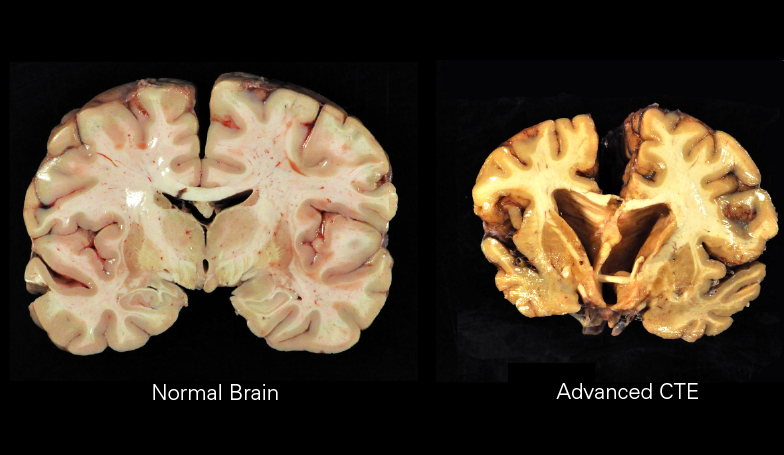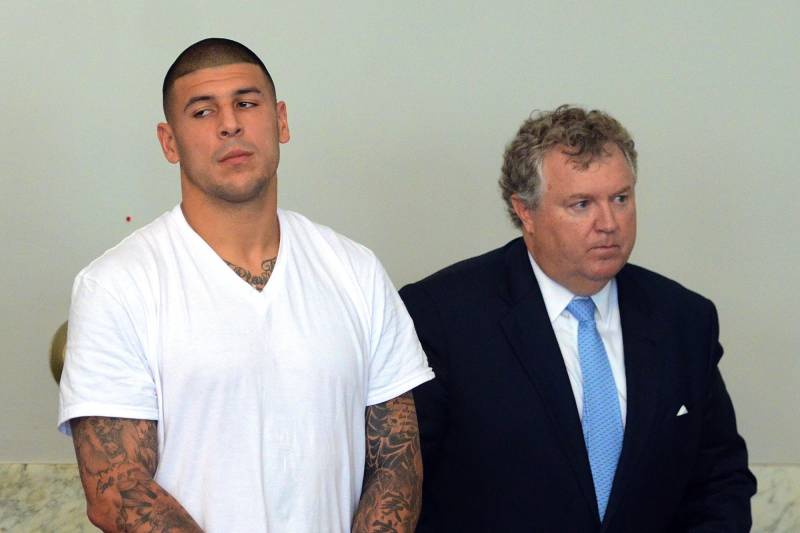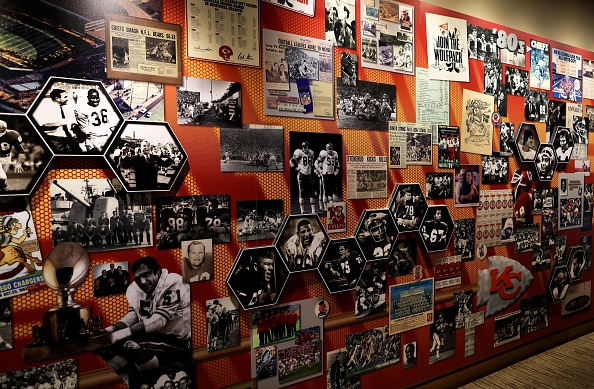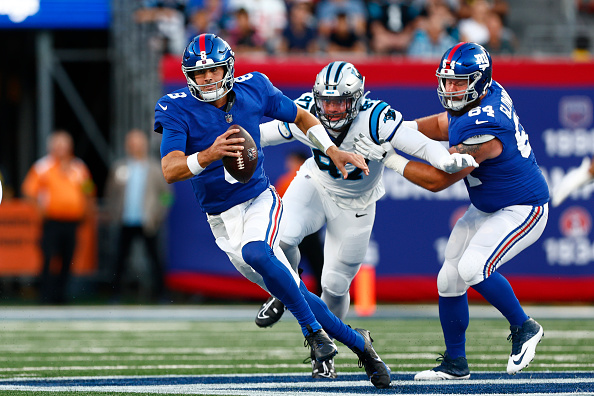“Understand how one stupid play, one stupid penalty, one mistake, ends it for all of us.” – Bill Belichick
Based on how close one was to Aaron Hernandez, there are many different ways to remember him.
If you grew up or lived in Bristol, Conn., perhaps you remembered him as a passionate child who loved playing football. If you are a fan of the New England Patriots, you might remember him as a “what could have been” story. If you are a family member of Odin Lloyd, Daniel de Abreu, or Safiro Furtado, you probably remember him as a murderer.
Whatever your emotions were towards the former Patriots star tight end, you were likely glued to Netflix over the past week, watching “Killer Inside: The Mind of Aaron Hernandez,” a three-part series that examined everything from the deceased’s upbringing, social life, sexuality, and what his brain looked like upon further examination after his suicide in 2017.
The intensity of these three hours of footage is a lot to process, yet incredibly eye-opening. People close to the Hernandez family, as well as reporters, offered their insights as to how the mind of Aaron Hernandez came unraveled and led to his involvement in not only the murder of Odin Lloyd but also the double-homicide of Safiro Furtado and Daniel de Abreu outside of a Boston nightclub, the latter of which he was found not guilty as charged.
Having watched this documentary a few times now, I want to attempt to crack the code as to what went wrong with the would-be 30-year-old Bristol native. Was he a serial murderer? Was he the product of an incredibly traumatic childhood? Was he not in his right mind when he pulled the trigger on one guy by conviction, and two more by accusation?
These are all questions I’m going to attempt to answer to the best of my abilities, based on what this documentary brought to light.
*All quotes are from the documentary.
Upbringing
Aaron Hernandez grew up in Bristol under the parenting of Terri and Dennis Hernandez. His brother, D.J., and he lived in the same room together, so they often knew what was going on with their parents at the same time.
Dennis was considered a “man’s man” in the town but was about as abusive as they come. The documentary recounts a time where Hernandez’s father came home, having gotten drunk, and a fight ensued between Terri and Dennis. Terri hit Dennis with a phone, and Dennis retaliated by smashing Terri’s face into the sink until she lost consciousness. However, even with instances like this, Aaron was a child in need of structure. He was kept in line by his father, and he respected his father. So when a simple hernia surgery that went haywire took his life when Aaron Hernandez was 16, it shook the youngster.
“When I saw him at the wake it was like looking into a new person’s eyes. Something had changed,” said Dennis Sansoucie, a lifelong friend and high school teammate of Hernandez. “He had no emotion.”
We all, as human beings, experience loss at some point in our lives. As best as we try to avoid it, people that we love end up dying. Sometimes, it is expected. Other times, not so much. The point is that we all experience a time where we need to mourn, and all of us experience it differently.
However, Hernandez didn’t have the luxury of having a mother who could mourn with him as Terri ended up having an affair with a family member’s husband, who later moved in with the Hernandezes. As a result, Aaron Hernandez built resentment towards his mother and often would spend time at Tanya Singleton, the aforementioned cousin’s, house, which led to more care-free “parenting” and more interesting characters came into the fray.
“I don’t put you down, and you (expletive) my whole life up,” Aaron told his mother over a prison-recorded phone call. “I was the happiest (expletive) little kid in the world, and you (expletive) me up.”
Hernandez went on to talk about how he had nobody after his father’s death, had to go off to college at the University of Florida, and sarcastically asked her if she expected him to become a “perfect little angel.”
This relationship is later visited when audio of a phone call is played where Terri Hernandez is pleading with her son to give her $1 million of the five-year, $40 million contract extension he signed in 2013, thus showing that his mother, who did every possible thing incorrectly in the aftermath of Aaron’s father’s death, is expecting to be handed money that her son worked hard for.
Football
“He was always into the mental aspect of everything. … Aaron [Hernandez] was the Albert Einstein of X’s and O’s,” Stephen Ziogas, a lifelong friend of Hernandez, said.
Hernandez started playing football at a young age, where he was taught the importance of staying on the field. You’re encouraged and oftentimes praised for “gutting it out” and playing through the pain.
The documentary made a point to recount the time he was knocked out cold in a high school football game, thus leading to the EMTs carrying him off the field. On top of that, we were re-introduced to countless blows to the head that Hernandez took that, at the time, we glossed over because he’d either keep playing or didn’t miss extended time as a result of it.
Chris Borland, the ex-49ers linebacker who retired after his rookie season due to concerns about head trauma, talked about how upper-classmen at Wisconsin would be injected with a steroid called Toradol, which was a painkiller that allowed you to play through whatever injury you had.
Why was Toradol so prevalent? As it turns out, when colleges have big football programs, they make a ton of their money off of the likeness of their star players. If a guy like Aaron Hernandez or Chris Borland missed a game and they lose, that’s a lot of money being lost by the university.
That’s a lot of pressure to bestow upon a college kid.
When playing a game as violent as football, concussions mustn’t be taken lightly. And with each blow to the head, there was more damage being done to his brain.
“Weed and Toradol. That’s all you need, baby!” Hernandez said to Mike Pouncey in a phone call.
His friends
As mentioned before, Hernandez was introduced to many interesting characters in his time spent at Tanya Singleton’s house. At this house, there was a lot more partying, pot-smoking, and generally care-free acting.
This set Aaron off on the path towards hanging around with the wrong people like Anthony Bradley, Ernest “Bo” Wallace, and Carlos “Charley Boy” Ortiz. The latter two were arrested by association to the Odin Lloyd murder, and the former testified against Hernandez and even claimed that the ex-Patriots tight end shot him in the face after an argument at a club.
After allegedly shooting Bradley, Hernandez went to Wallace and Ortiz, who were in charge of protecting Aaron from the revenge Bradley claimed to be seeking.
This paranoia led to Hernandez implementing a massive security system in his North Attleboro, Mass., home, and even requested a trade from the Patriots out of fear for his life. The team promptly told him no and suggested he get another apartment, but perhaps one more “secure.”
Sexuality
Sprinkled throughout this documentary is the topic of Aaron Hernandez’s sexuality. Yes, he had a fiancé (Shayanna Jenkins). Yes, he had a daughter (Avielle). However, he also was allegedly a closet gay man, many thanks to an incident where Aaron may have been sexually assaulted by a teenage boy when he was a child.
“Aaron participated with many people. I was a small piece of Aaron’s sexual activity,” Dennis Sansoucie said. “If I look at it in the year we’re in, yes, we were in a relationship back then [from seventh grade to junior year in high school]. But, at the time, you don’t look at it like that.”
Back when he was in high school, there was a small number of openly gay people and those who were often ridiculed and made fun of. The whole idea of two football players being gay was a concept that was unheard of, and thus creating a sense of paranoia in Aaron at a young age.
“If we get caught, it’s ruined. Our parents are going to disown us,” Sansoucie said.
Why were they so paranoid? They both came from wildly homophobic fathers. Aaron’s father would “slap the (expletive) right out of you” and did everything to remove any ounce of femininity out of his sons.
So, as Aaron grew older and further developed his game to the point where he went to a Division I college and then the NFL, the likelihood of acceptance from the general public grew less and less.
Having to pretend you’re somebody you’re not for your entire life can take a serious toll on your mentality and can drive you to your breaking point where you just snap.
CTE
Chronic traumatic encephalopathy (CTE) is a neurodegenerative disease caused by repeated head injuries.

Unfortunately, it isn’t possible to check the brain for CTE before death. However, upon death, Hernandez’s family sent his brain to be researched by Ann McKee, who was the head of Boston University’s CTE Center.
McKee’s research indicated that Aaron Hernandez suffered from Stage 3 CTE, which researchers had never seen out of someone younger than the age of 46. Aaron was 27 when he killed himself in his jail cell.
“The hippocampus, which plays a key role in memory, had shrunk. The fornix, which also contributes to memory function, had atrophied. The frontal lobe, which is responsible for problem-solving, judgment, impulse control and social behavior, had been pockmarked with tau protein. The amygdala, which produces emotional regulation, emotional behavior, fear, and anxiety, had been severely affected. The temporal lobes, which process sights and sounds, showed significant damage.”
(via the Washington Post)
Synopsis
Aaron Hernandez, by outside accounts, had everything he could’ve ever wanted. However, that couldn’t have been any further from the truth.
Hernandez, thanks to both physical and mental trauma done to his brain and psyche, hadn’t been in his right mind for a long time. Starting with the physical abuse from his father to the emotional rollercoaster that came from Dennis’s death and his mother’s affair with his cousin’s husband, Hernandez already had a troubling childhood. Couple that with countless head injuries and what appears to be his sexuality that he was unable to be open about, and you have a guy who was so far from being capable of rational thought.
That being said, Hernandez still should be remembered for the crime the court decided he committed and for the other crimes he allegedly took part in, whether he pulled the trigger or not.
However, to criticize the criminal, one must look at all the details of the situation. Once you look at all of the details, you cannot help but feel some ounce of sympathy for the guy.
You can both sympathize with the man behind the gun on top of being unable to forgive him for what he had done.







